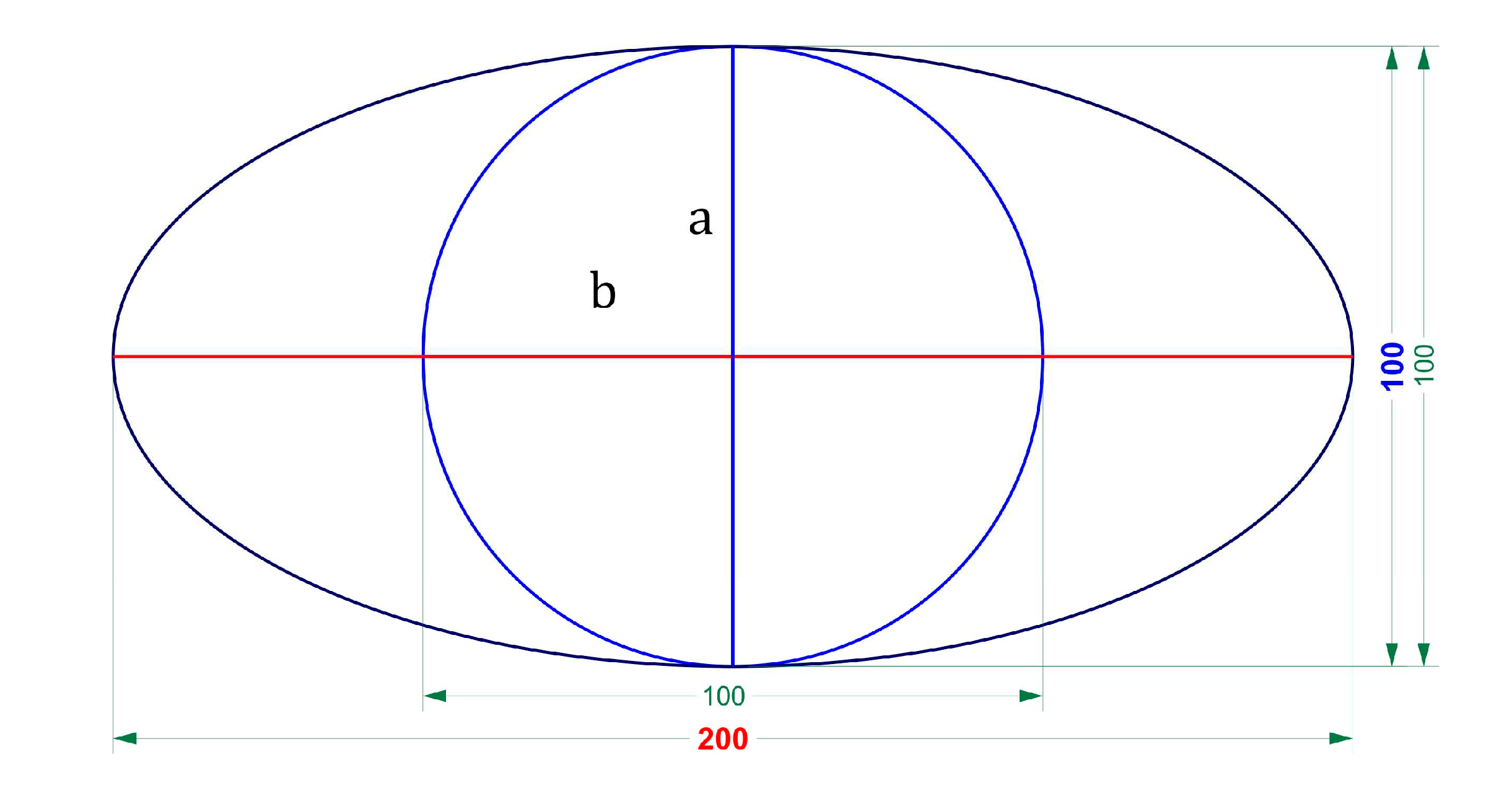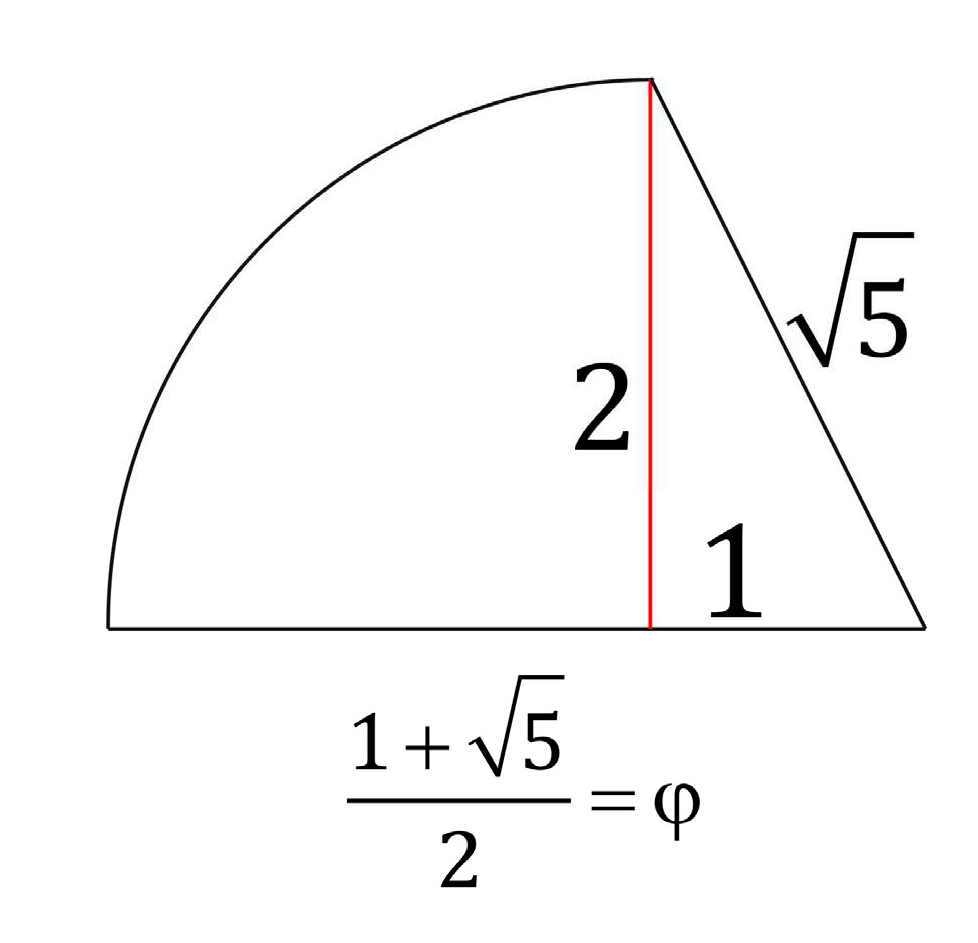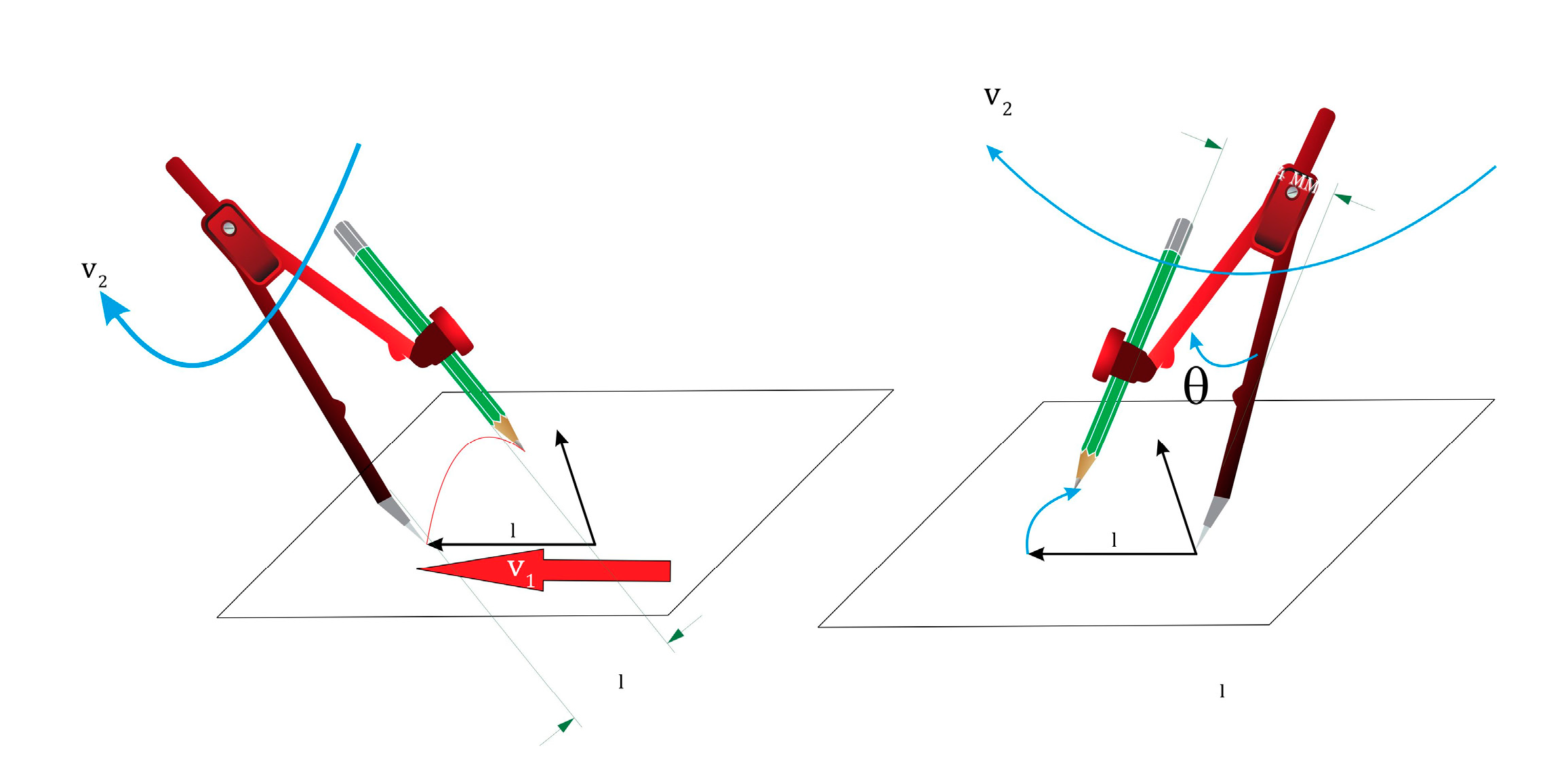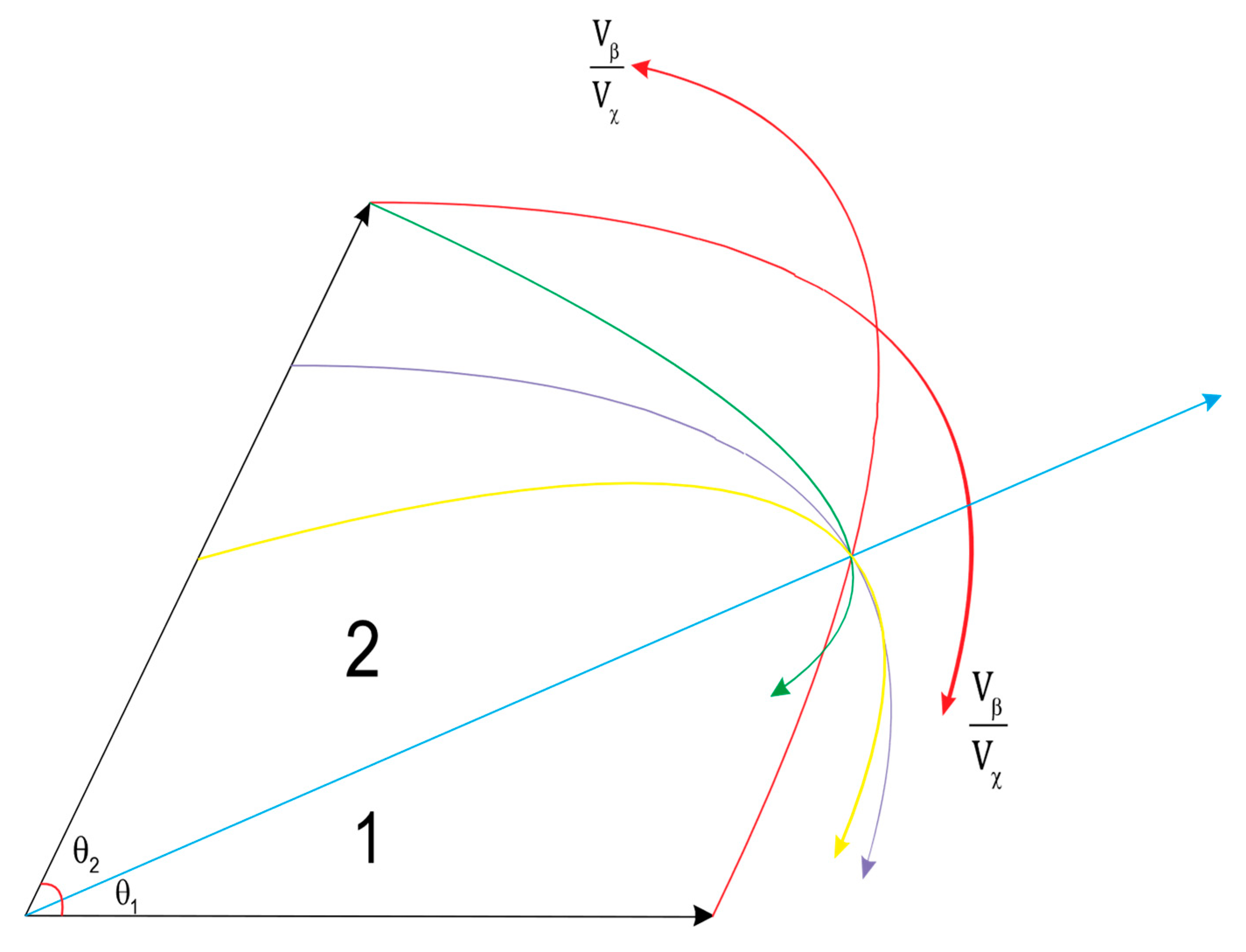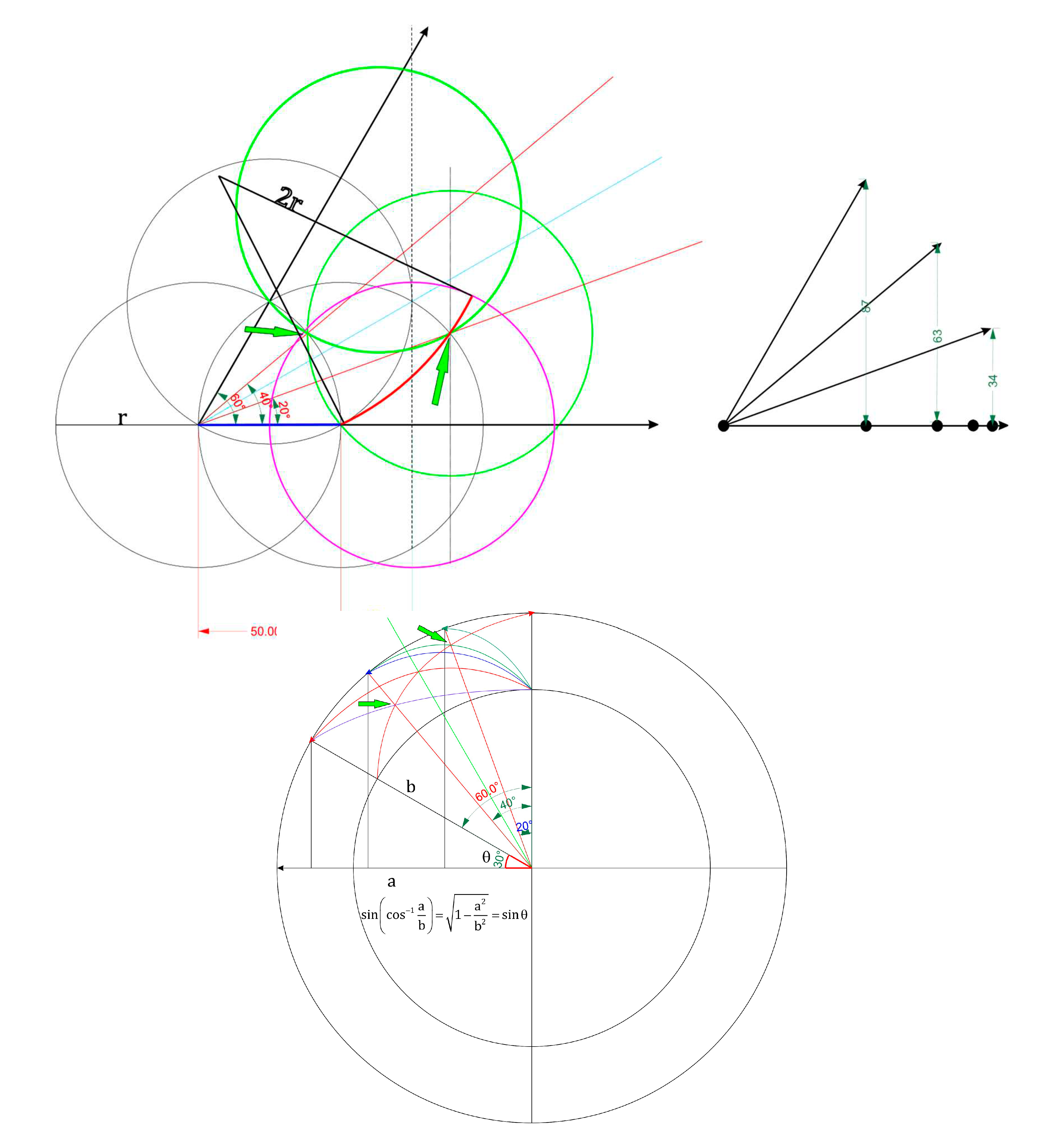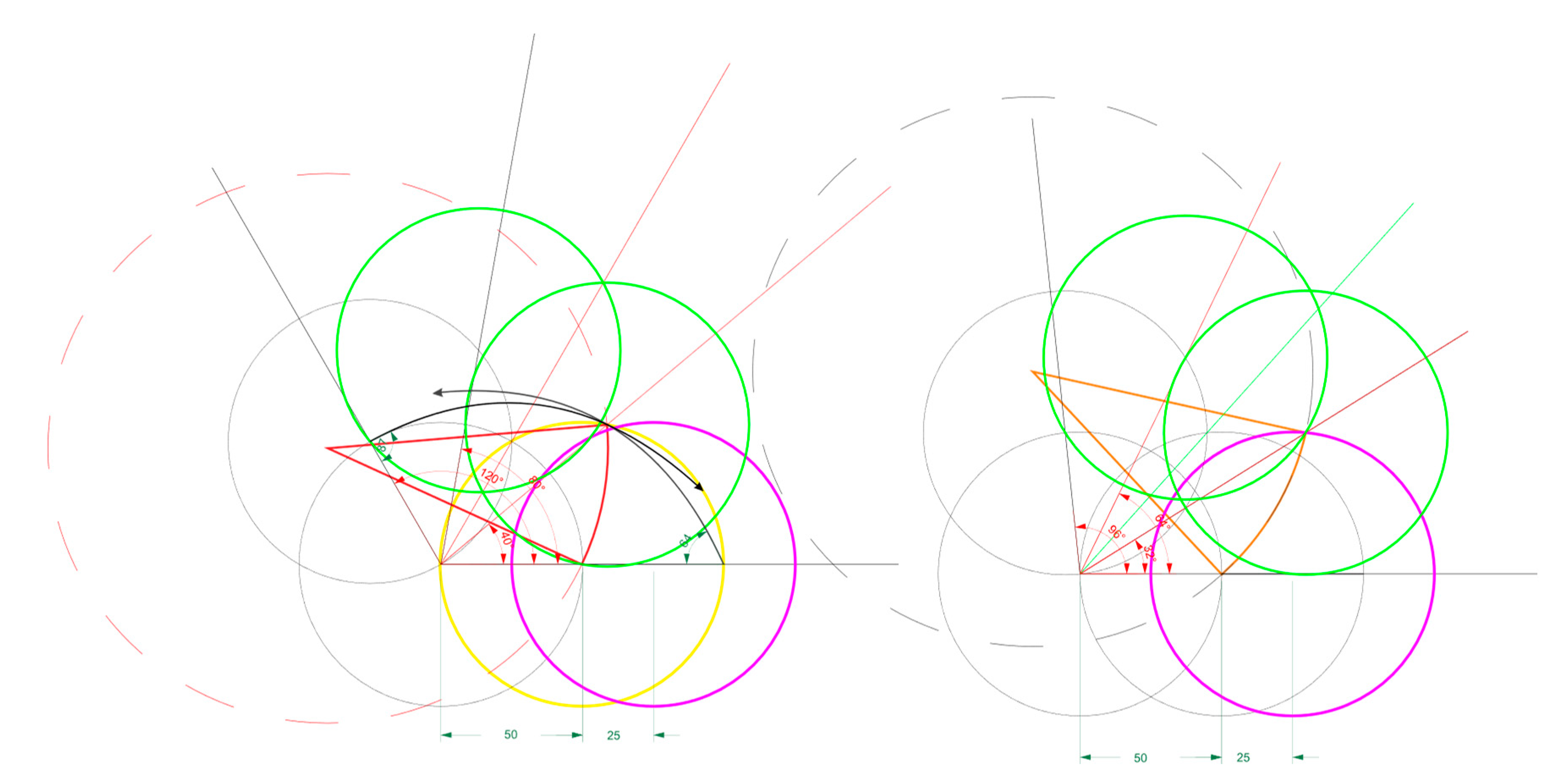1. Introduction
Angle trisection with compasseses is one of the unsolvable problems of ancient times. By drawing the angle bisector in several steps, some angles can be divided into three equal parts. There are different ways to Angle trisection.[
1,
2,
3]
Probir Roy's proposed Method is a much more detailed and comprehensive one.[
4] Although this is not possible from the point of view of trigonometry, if unsolvable problems can be examined over time, the results will be different. According to the theory of general balance in six dimensions of space and time [
5], events occur over time. For example, a human being can pass through several gates like an electron. When drawing a circle with compasseses, you follow the number pi. Now, if the radius of the circle also changes, you can overcome the limitations in trigonometry. If the fixed arm of the compasses or its angle moves in a desired direction at the same time as the compasses rotates around its axis, you will overcome all the limitations of trigonometry for angle trisection.
2. Golden ratio
The golden ratio in the six-dimensional space-time arises from the doubling of the time dimension stress in relation to the space dimension. In principle, the golden constant follows the doubling ratio. (2.1). In the six-dimensional space-time, the golden constant is directly related to the number pi and the Euler. (2.2). Pi is a different number over time. (2.3)
The ratio of the circumference to the diameter with the double expansion of the width to the length in a circle has a direct relationship with the eccentricity ratio created. (2.4)
Figure 1
When a diameter in an expanding circle has a different speed, eccentricity of the ellipse occurs.
Figure 1. Now expansion is like two different speed. Whenever the expansion speed is twice the moving speed, the golden ratio is created.
Figure 2. The golden ratio can be obtained using compasseses.
Figure 2
3. Materials and Methods
At the same time as the bow is drawn by the compasseses, the fixed needle also moves on one of the sides of the angle equal to the opening of the compasses.
Figure 3
The rotation speed of the compasseses is twice the speed of the needle movement. (3.1) By repeating this work on the other side, the angle is divided into two unequal parts. that one part is twice the other part.
As seen in
Figure 3, when the angle of the compasses is fixed, both arms move. And when one arm is fixed, the angle between the arms changes. By drawing the golden points on the sides of the angle, you can calculate the golden ratio between the change of the angle of the compasses and the speed of rotation of the compasses.
Figure 4.
As the length of the sides of an angle increases, that angle expands in the plane. Every angle has a golden point outside the opening of the angle. It is not possible to find the exact location of the point. Due to the eccentricity of the ellipse and the double ratio of the golden ratio, The only way is the ratio between the speed of the compasses rotation and the change of the angle of the compasseses. The view is
Figure 5,
Figure 6
4. Results
Examining events over time brings different ways to solve unsolved problems in mathematics, geometry and physics. However, it seems that the nature of the problem has changed. Algebraic operation changes over time. There is no certainty for physics and math facts to remain constant over time. Changing the laws of Euclidean geometry in curved spaces shows the realness of time. No equation has objectivity over time. And all the facts in the world are dependent on the passing of time. Natural numbers and fundamental natural constants are related to each other.[
6] The growth of plants, rain, biological molecules, the growth and metabolism of life organs, the structure of the universe and chemical reactions can express this relationship. Based on the evaluation of the growth of different systems over time, it is possible to understand the relationship between the three numbers pi, phi and Euler's number with each other. As the length of the sides of the angle increases, the points chosen to draw the arc should also change. Drawing an ellipse instead of a circle with a compasseses based on the eccentricity of the ellipse is the basic way to avoid the impossibility of angle trisection. Buffon's needle problem proves the relationship of pi in the past, present, and future times, with Euler's number and the golden constant in the six-dimensional space-time. The method presented in this paper can be used to prove many complex problems by examining events over time. Squaring the circle or even more complex problems such as Hodge's conjecture and Riemann hypothesis can also be examined from this point of view.
Acknowledgements
The author would like to thank S. Sattar and E.razazi and their professors for helpful discussion and their valuable comments.
References
- Contreiras, G. A GEOMETRICA COM ORIGAMI, RESOLUÇÃO DO PROBLEMA DA DUPLICAÇÃO DO CUBO E DA TRISSECÇÃO DE UM ÂNGULO: Perspetivas Futuras Para o Programa de Geometria Euclidiana no Ensino Superior em Angola. ERAS| European Review of Artistic Studies 2019, 10, 1-19. [CrossRef]
- BARBOSA, J. P. C. Investigação histórica referente à base algébrica das construções geométricas com régua e compasseso: o trabalho de Pierre Laurent Wantzel (Master's thesis, Universidade Federal de Pernambuco). . 2011.https://repositorio.ufpe.br/handle/123456789/4052.
- Bubna, M. A procedure to (approximately) trisect an arbitrary angle. At Right Angles 2023, 51-52. https://www.dropbox.com/s/c6ux9r787wdpotf/Trisect%20an%20angle.mp4?dl=0.
- Roy, P. A UNIQUE METHOD FOR THE TRISECTION OF AN ARBITRARY ANGLE. [CrossRef]
- Mousavi, S.K. The General Balance in the Six Dimensional of Space-Time. Preprints 2023, 2023081112. [Google Scholar] [CrossRef]
- Pellis, S. Unity formulas for the coupling constants and the dimensionless physical constants. Journal of High Energy Physics, Gravitation and Cosmology 2022, 9, 245–294. [Google Scholar] [CrossRef]
|
Disclaimer/Publisher’s Note: The statements, opinions and data contained in all publications are solely those of the individual author(s) and contributor(s) and not of MDPI and/or the editor(s). MDPI and/or the editor(s) disclaim responsibility for any injury to people or property resulting from any ideas, methods, instructions or products referred to in the content. |
© 2023 by the authors. Licensee MDPI, Basel, Switzerland. This article is an open access article distributed under the terms and conditions of the Creative Commons Attribution (CC BY) license (http://creativecommons.org/licenses/by/4.0/).
